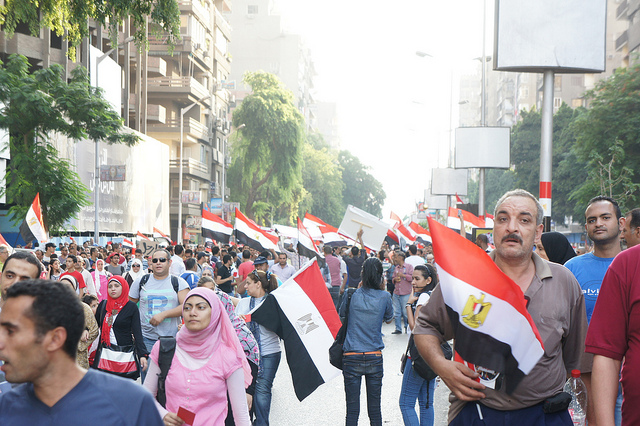Please support our coverage of democratic movements and become a supporting member of rabble.ca.
My friend, Dr. Chris Giannou, was back in his hometown, Toronto, last month to help lead a Red Cross training session on disasters. He lives on the Greek coast now and has spent the last 40 years in virtually every global war zone, about half of that in the Mideast. He did his surgical training in Cairo. I asked if Egypt had squandered what it won during the Arab Spring. “Tsk, tsk, tsk,” he said, wagging his finger. “The whole Arab world has come unfrozen. It won’t go back to where it was — because change can happen now.”
That’s what we tend to miss, looking at events like Egypt’s upheaval this week. The Arab Spring wasn’t an event with a result to preserve, it was a piece of process. Same for democratization. It isn’t the equivalent of elections, they’re just part of that process, for better and sometimes worse. This is easy to say and hard to grasp, since we tend to view events through the filter of fixed definitions and standards. You could see it on CBC coverage Wednesday.
Andrew Nichols kept asking guests, “Is this a military coup?” i.e., bad and undemocratic. But coups can be pro-democratic, like Portugal’s in 1974. It’s clear the Egyptian military have their own goals but they wouldn’t have acted without a huge popular — i.e., democratic — call to do so. Ian Hanomansing told someone in Tahrir Square, “Here in Canada we hold democracy in such high regard and you had an elected president . . .” But that’s assuming the equation between democracy and elections, which isn’t so obvious, even “here.” Rosemary Barton averred, “it takes a long time for democracy to take root.” But what if it isn’t like a tree you buy at the garden centre and replant at home. What if it’s a seed that may sprout and grow in different ways — or fail?
People in the Arab world don’t genuflect before “our” democratic definitions. They have their own, and the gold standard is their experience two years ago when they went fearlessly into the streets to depose tyrants. That wasn’t for the sake of elections, it was for democracy, not the same thing, though they may be related. Or not: some youth central to those victories scorned the elections that followed; in Tunisia there was a group called Bloggers Against the Election. The point is the process is still unfolding; there may be times when elections are undemocratic and coups aren’t. Whoops, I feel like I just said something risky, maybe I should stuff it back in my mouth.
It is risky in fact, and can lead to awful results. But it feels less risky if you don’t assume the definition of democracy or human progress has reached any fixed end points. Most cultural activity only really began 8,000 to 12,000 years ago, as a teenager recently told me; it would be odd to assume anything is complete.
In that light, it’s we who should uncouple from fixed definitions and learn something from their openness. Even western critics of the coup, for instance, say that Egyptian president Mohammed Morsi got only 51 per cent of the votes but acted as if he could ignore the rest. Yet Stephen Harper got under 40 per cent last election and has proceeded with much of his agenda anyway.
In fact, there are signs a reverse learning process may be starting. It’s interesting how the notion that Morsi “understood democracy as only being about elections” (Reuters) began slipping into stories. CBC’s Barton did note that you “can ask if elections equal democracy.” Even Barack Obama told Morsi to remember they aren’t the same. The next stage would be to apply that insight to ourselves, not just them.
So I disagree with gloomy assessments of this week’s turn of events in Egypt. Like a Guardian editorial saying Egypt “has returned to where it was two years ago.” Or the Star: “It subverts the Arab Spring’s most important gain: rule by the people.” At the least the jury is out on that. Democracy isn’t a classic script that actors must memorize and never deviate from. It’s more like improv, shifting and reconstituting. Or as Chris might say: “Tsk, tsk, tsk — “
This article was first published in the Toronto Star.
Photo: Zeinab Mohamed/flickr



